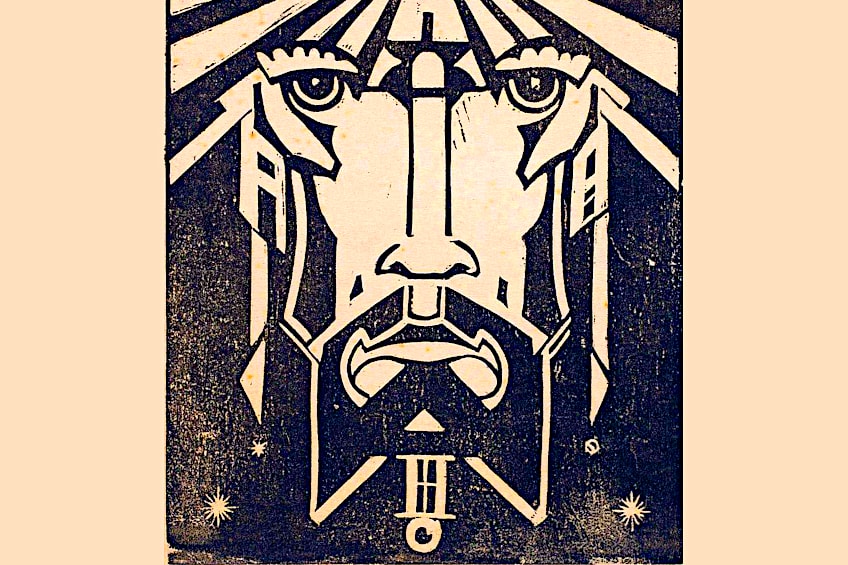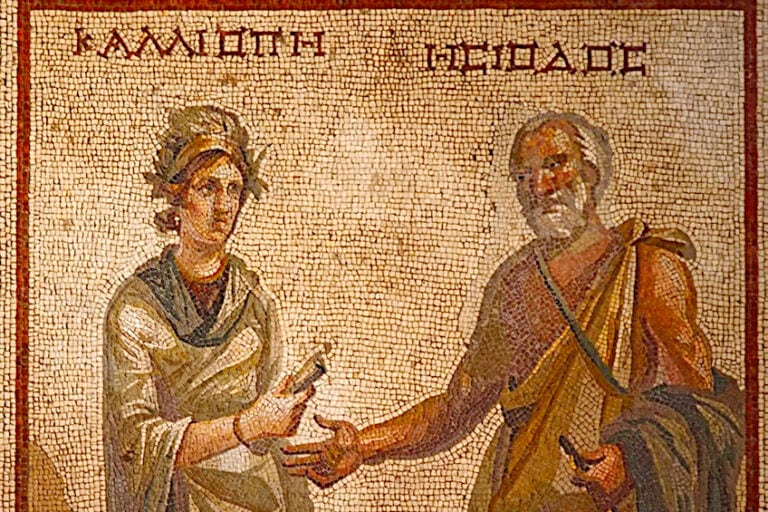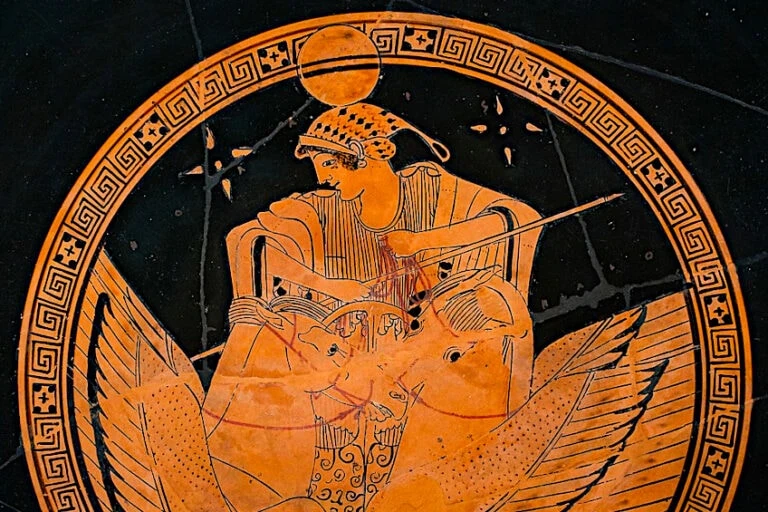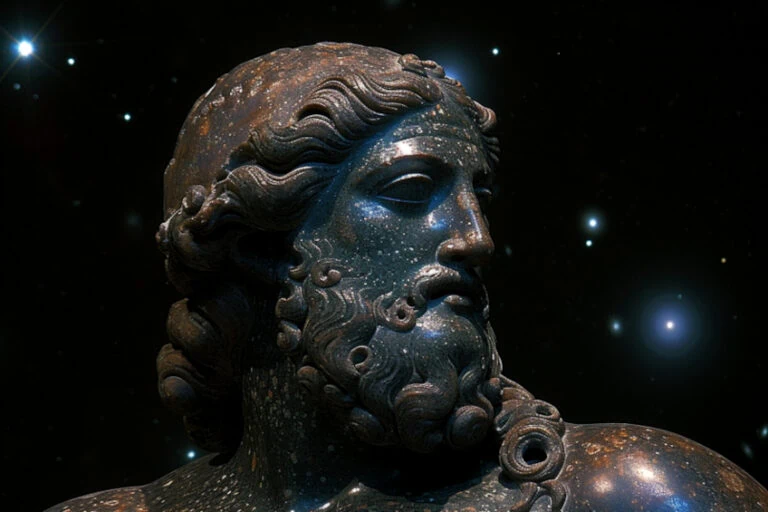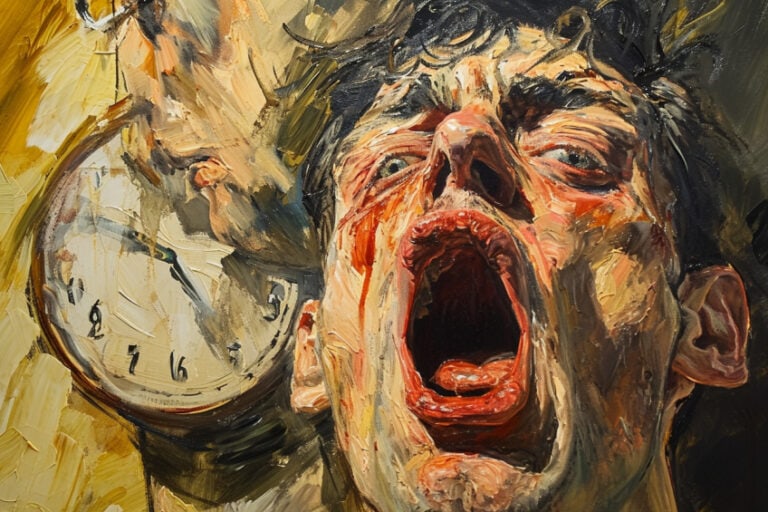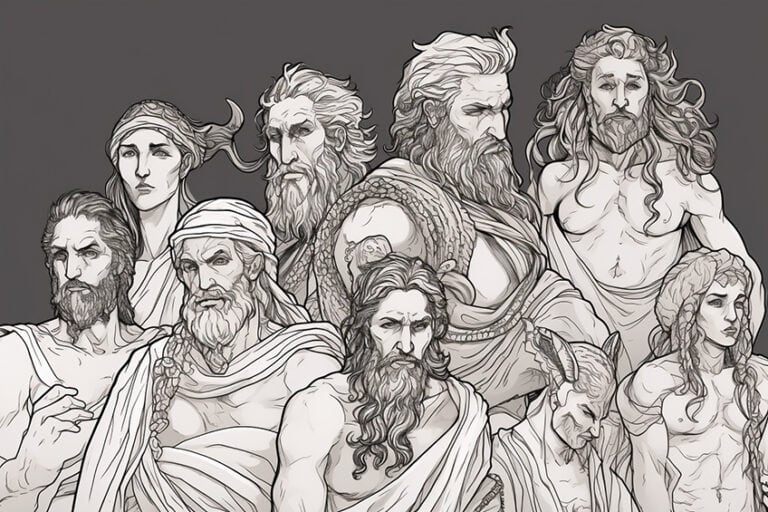Greek God Uranus – The Sky-God Who Buried His Children
In Greek mythology, Uranus was the personification of the fertilizing sky. Amongst the first to emerge from Chaos, Uranus was a primordial god, the first generation of Greek gods who embodied the natural forces. What is Uranus’ mythology and what role did he play among the gods and mortals of the ancient Greek world? Below, we will address these questions and more, as we discover the mythology of the Greek god Uranus.
Contents
Exploring the Mythology of the Greek God Uranus
| Name | Uranus or Ouranos |
| Gender | Male |
| Personality | Tyrannical, Innovative, and unpredictable |
| Parents | Gaia (no father) |
| Children | The Cyclopes, the Titans, and the Giants |
| Domain | The sky |
| Symbols | Zodiac wheel |
The mythology of Uranus is predominantly connected to the succession myth that resulted in the establishment of the Olympian order. In ancient Greek mythology, Uranus either came into existence out of Chaos alongside the earth-goddess Gaia, or he was her fist-born son. Together, these two primordial deities gave birth to the majority of beings that followed. The exception being the various monsters and negative personifications were born of their sibling, the Goddess Nyx, personification of night.
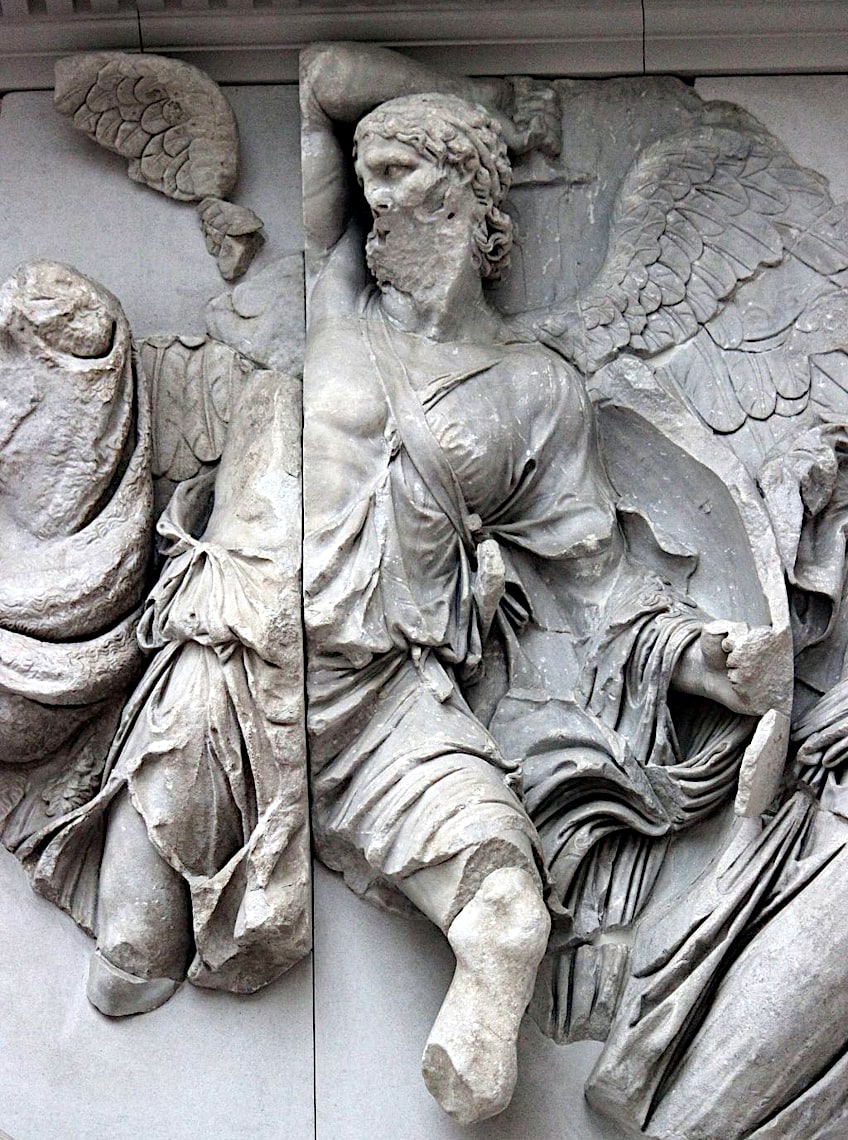 Uranus as depicted on the Pergamon Altar relief (2nd Century BCE); Miguel Hermoso Cuesta, CC BY-SA 4.0, via Wikimedia Commons
Uranus as depicted on the Pergamon Altar relief (2nd Century BCE); Miguel Hermoso Cuesta, CC BY-SA 4.0, via Wikimedia Commons
Described by Hesiod as one of the “former- gods”, Uranus was more significant in ancient Greek myth than in cult, and embodied the sky’s generative powers alongside its dangers.
The Greek God Uranus’ Background and Family
The Greek god Uranus is regarded as one of the Greek primordial gods, but what exactly does that mean? The primordial gods were personifications of the fundamental forces and elements that first came into existence.
The primordial gods’ origins and role in the formation of the world was most vividly described by the poet Hesiod in the Theogony.
Chaos is the embodiment of the formless void, symbolizing the universe’s original condition before it assumed shape. Gaia is the Earth’s personification, embodying the corporeal essence of our planet and natural environment. Tartarus represents the deep abyss and is connected with the imprisonment of the Titans. Eros is the embodiment of desire and love and is regarded as the universe’s creative force. Last, we have Uranus, the embodiment of the sky.
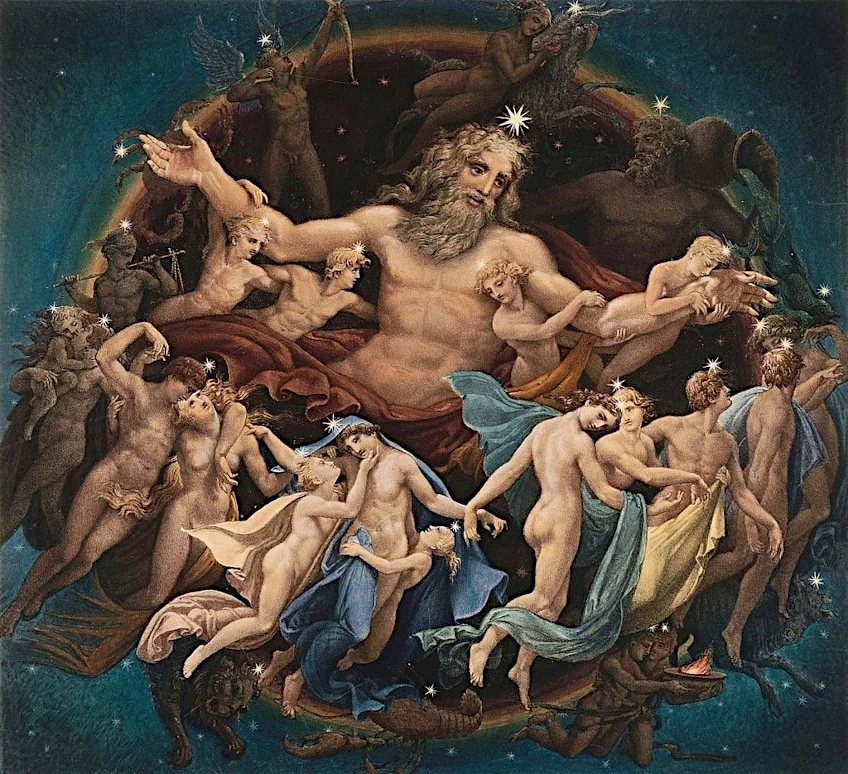 Uranus and the Dance of the Stars by Karl Friedrich Schinkel (1834); Karl Friedrich Schinkel, Public domain, via Wikimedia Commons
Uranus and the Dance of the Stars by Karl Friedrich Schinkel (1834); Karl Friedrich Schinkel, Public domain, via Wikimedia Commons
When it comes to Uranus’ mythology, there is some debate as to his origins and conception. In older versions of Greek mythology, Uranus is regarded as being around before the dawn of time and was Gaia’s partner. In other versions, Chaos birthed Gaia who then created Uranus. Whether partner or offspring, the two then conceived the Cyclopes, the Titans, and the Hecatoncheires, thus populating the pantheon of the subsequent Greek gods that followed.
In the most common versions of the myth, the Greek god Uranus pushed his children back into Gaia as soon as they were born. In other versions, Uranus kept impregnating Gaia and she could no longer bear having to constantly give birth.
She asked her sons to protect her from their father. Their son Cronus (Time) agreed and castrated Uranus with a sickle supplied by his mother. The blood that fell to the Earth from the castration gave rise to the Giants and the Furies. Cronus threw his father’s genitals into the Mediterranean sea and Aphrodite was born from the foam that was generated. While Cronus may have been successful in putting an end to his father’s tyranny, his actions resulted in the separation of the heavens and the Earth.
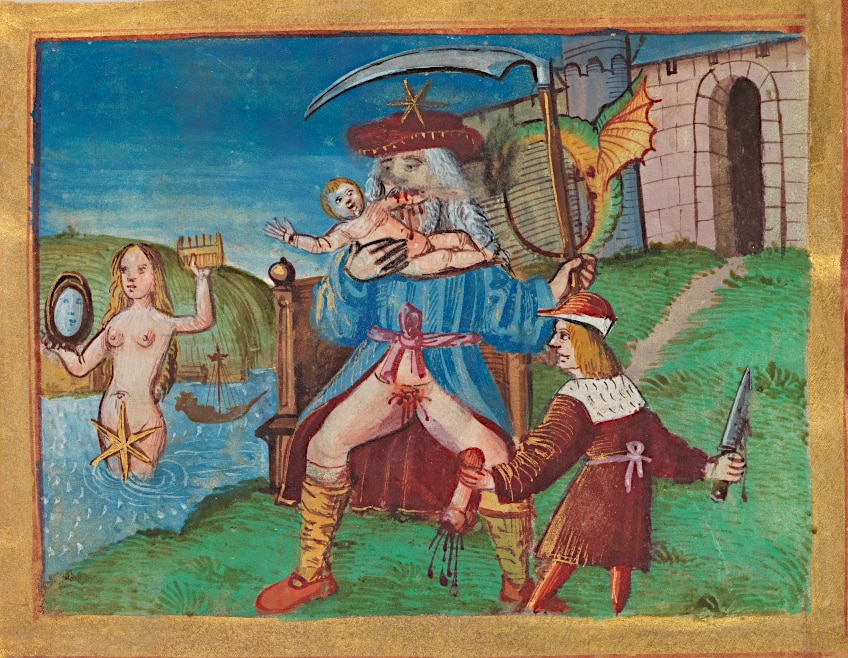 Illuminated manuscript depicting the castration of Uranus and the birth of Aphrodite (c. 1501). Uranus is identified as Saturn (Cronus) and is depicted devouring his son, conflating two different episodes in the Succession Myth; AnonymousUnknown author, Public domain, via Wikimedia Commons
Illuminated manuscript depicting the castration of Uranus and the birth of Aphrodite (c. 1501). Uranus is identified as Saturn (Cronus) and is depicted devouring his son, conflating two different episodes in the Succession Myth; AnonymousUnknown author, Public domain, via Wikimedia Commons
The Greek God Uranus’ Family
So, we know that Uranus was either the offspring or partner of Gaia (or perhaps even both), but who was Uranus’ father? According to subsequent versions of the story, his father was either Akmon or Aether. The ancient people believed that the Earth was actually a flat plane covered by some sort of dome and that Aether was among the three “breaths” of air that filled the dome.
In Greek mythology, Uranus also had two siblings, Pontus (the ocean) and Ourea (the mountains). Upon Gaia’s emergence from Chaos, she gave birth to the heavens, the ocean, and the land, thus these gods are viewed as the first to come into existence.
The Significant Offspring of the Greek God Uranus
In total, Uranus and Gaia had 18 offspring together, comprising three Hecatoncheires (Cyges, Cottus, Braiseos), three Cyclopes (Arges, Steropes, Brontes), and 12 Titans (among them Cronus, Rhea, Hyperion, Theia, and Oceanus). Once Uranus was deposed, Cronus ascended to power. Cronus fathered several offspring with Rhea, including Poseidon, Demeter, Hades, Hera, and Zeus. Cronus would be plagued with the same fears that one of his offspring would try to dethrone him and so consumed all of his children whole. Zeus was not swallowed due to his mother Rhea’s cunning, and eventually set all of his siblings free, becoming the king of the Olympian Greek gods.
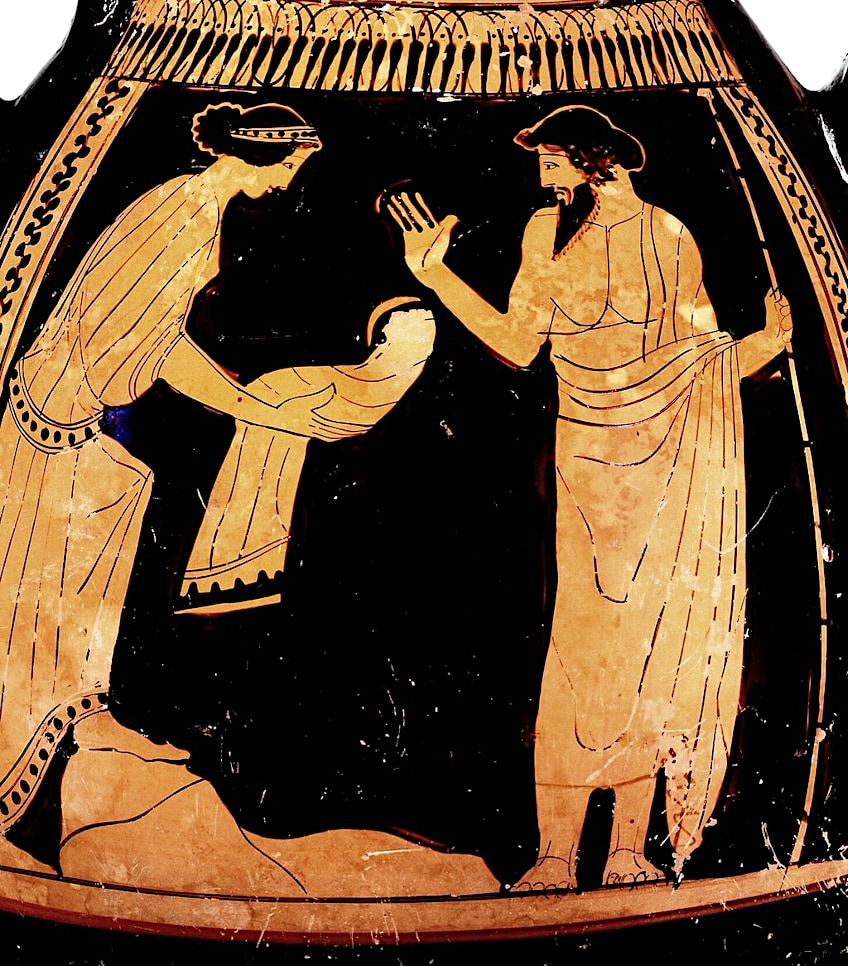 Red-figure pelike with a depiction of Rhea handing Cronus a rock disguised as the infant Zeus (c. 460-450 BCE); attribuito al it:Pittore di Nausicaa, Public domain, via Wikimedia Commons
Red-figure pelike with a depiction of Rhea handing Cronus a rock disguised as the infant Zeus (c. 460-450 BCE); attribuito al it:Pittore di Nausicaa, Public domain, via Wikimedia Commons
The section of the story in which Uranus is deposed by his son has become known as the “Succession Myth,” in which fathers suppressed their children only to be overthrown by them. This destructive cycle ended when Zeus ascended and founded the Olympian order.
With the help of a prophesy supplied by Uranus and Gaia, Zeus knew not to risk fathering a son with the Goddess Metis (wisdom/ingenuity) since this son would be stronger than him, and eventually overthrow his rule thereby continuing the destructive cycle of divine successions.
Instead, Zeus swallowed Metis, absorbing her attributes. Once Metis was part of Zeus, he developed a terrible headache. It was so painful that he asked Hephaestus to relieve the pressure by splitting his head open with an axe. As soon as this was done, the goddess Athena sprang from Zeus’ head fully grown and armed. Athena became Zeus’ most dependable ally and served as guide and mentor to the greatest heroes of Greek Mythology.
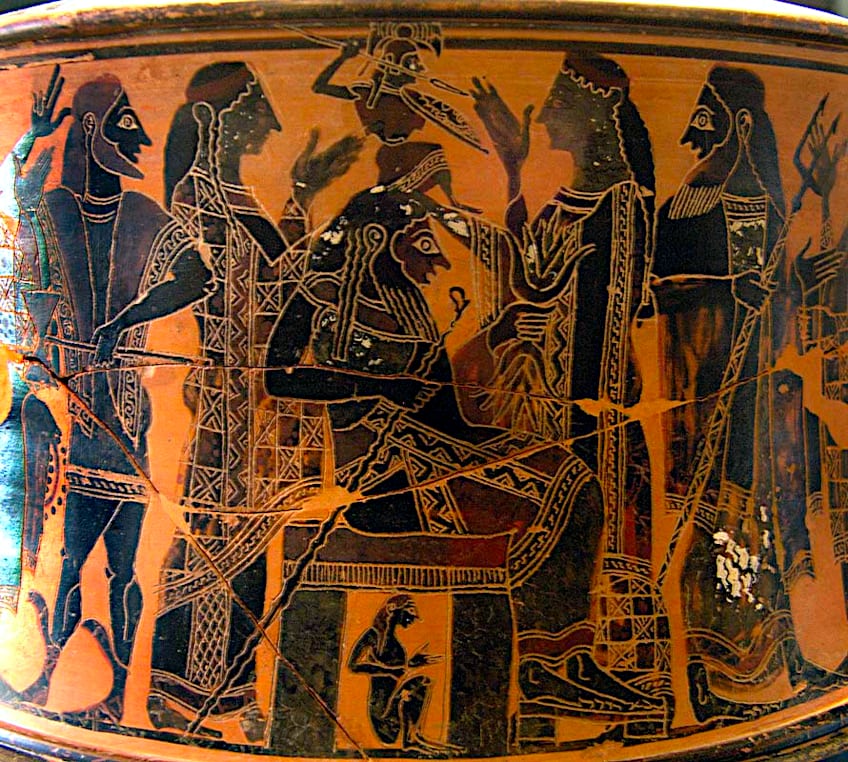 Black-figure tripod with a depiction of the birth of Athena (c. 570-560 BCE); Louvre Museum, Public domain, via Wikimedia Commons
Black-figure tripod with a depiction of the birth of Athena (c. 570-560 BCE); Louvre Museum, Public domain, via Wikimedia Commons
The Offspring of Uranus’ Blood
Not only did Uranus have offspring with Gaia, but there were also many different beings that emerged when his blood was spilled following his castration. Out of his blood arose the Giants, the Erinyes, and the Meliae. The Giants were massive and terrifying beasts that arose from Uranus’ blood. They were renowned for their tremendous strength and size. The Giants were regarded as the gods’ adversaries in Greek mythology, and they were involved in a violent struggle known as the Gigantomachy against the Olympian deities led by Zeus.
The Gigantomachy was an epic mythical event that portrayed the fight between the new gods and the old, with the Olympian gods finally triumphing.
The Erinyes, also referred to as the Furies, were vengeful female deities. They were also created from the blood that spilled from Uranus’ castration. The Furies were portrayed as frightening beings with snake-like hair, bat wings, and blood-red eyes. Their objective was to punish and torture people who had committed serious offenses, especially acts against family, including murder or violating vows. The Furies persistently followed wrongdoers, inflicting guilt and insanity on them until they faced punishment or obtained atonement.
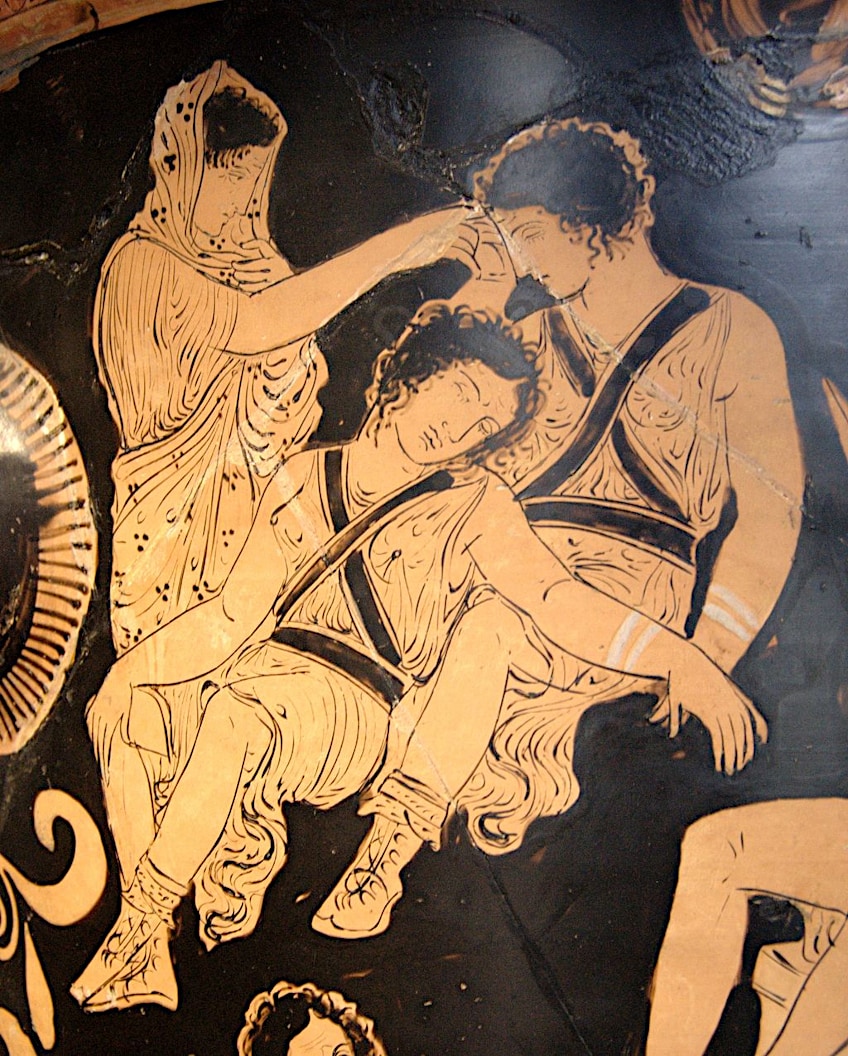 Apulian red-figure bell-krater showing the ghost of Clytemnestra trying to wake the Erinyes to avenge her murder (380-370 BCE); Louvre Museum, Public domain, via Wikimedia Commons
Apulian red-figure bell-krater showing the ghost of Clytemnestra trying to wake the Erinyes to avenge her murder (380-370 BCE); Louvre Museum, Public domain, via Wikimedia Commons
Meliae were nymphs that were linked with the ash tree. The Meliae were portrayed as loving nymphs who lived in woodlands and had a close relationship with nature. They were thought to nurture the ash trees and their progeny, guaranteeing their development and vitality. In Greek mythology, the ash tree was regarded as holy and represented rebirth and healing.
Potential Origins in Comparative Mythologies
This creation myth in ancient Greece is said to bear similarities to the creation myth of the Hurrian. In Hurrian mythology, the sky god is called Anu and his genitals were cut off by his son Kumarbis. As the sky god, Anus represented order and law in early Sumerian mythology as well as in the subsequent Assyrian and Babylonian mythologies.
This Near Eastern tale, which first emerged with the Hurrians of Anatolia and Syria, was soon embraced by Anatolia’s powerful Hittites, through whom it appears to have moved west to the world of the Greeks.
In Hesiod, Anu eventually became Uranus, who ends up being castrated by Cronus in the same way that Anu had been by his son, Kumarbi; eventually, Cronus is deposed by Zeus, much as the Hurro-Hittite Kumarbi was deposed by Teshub.
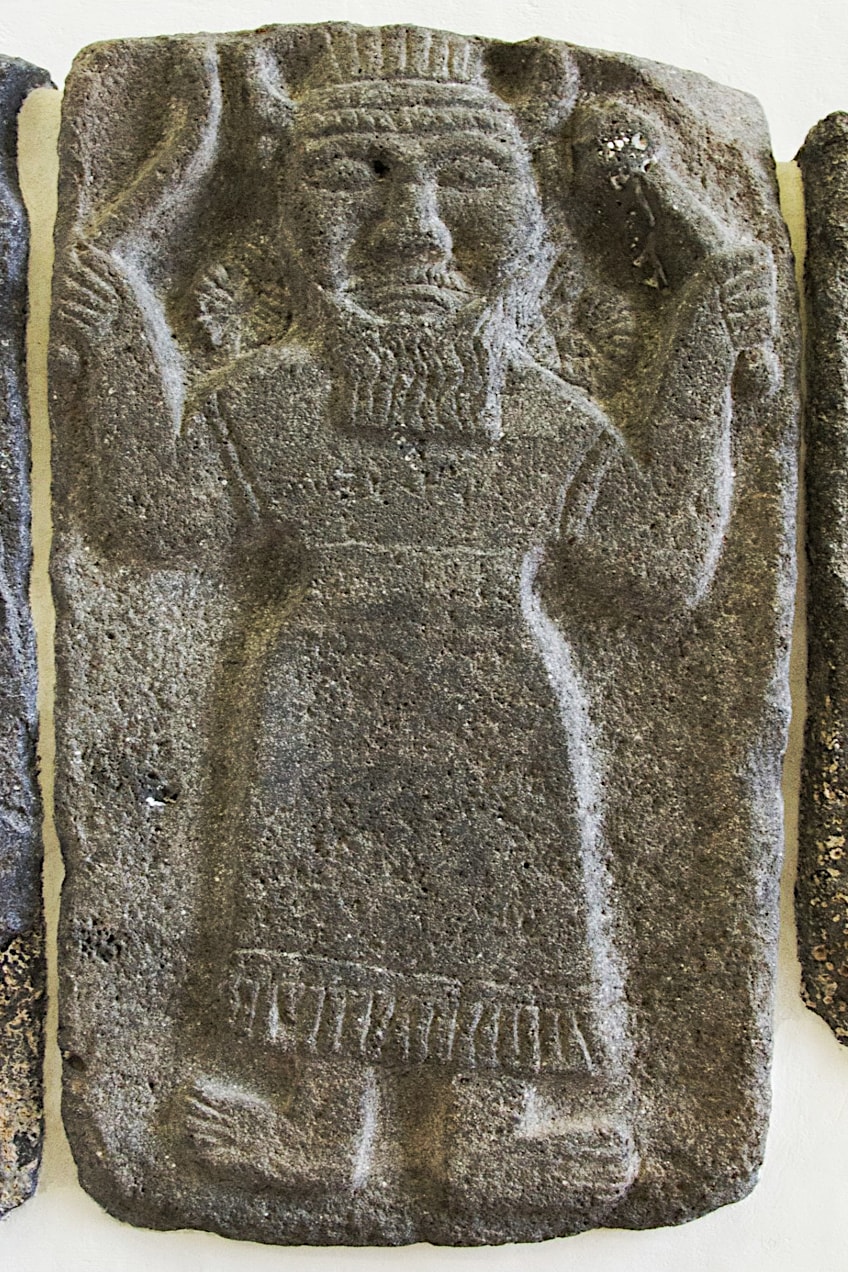 Relief from the Temple Palace of tell Halaf showing a god (Kumarbi?) holding a sickle and his father’s severed genitalia in his hands (9th Century BCE); Zde, CC BY-SA 4.0, via Wikimedia Commons
Relief from the Temple Palace of tell Halaf showing a god (Kumarbi?) holding a sickle and his father’s severed genitalia in his hands (9th Century BCE); Zde, CC BY-SA 4.0, via Wikimedia Commons
Other Near Eastern traditions may possibly have contributed to Uranus’ mythology. In Egyptian mythology, for example, the universe is created when the earth and heaven were separated from their intimate embrace. Some historians have also suggested that he may have originated from the Vedic Váruṇa, who was an Indo-European god regarded as the supreme god of order. He was also regarded as the god of the ocean, the sky, and the Milky Way.
Other Versions of His Origin Story
Though Hesiod’s version of Uranus’ particular role in Greek cosmogony received widespread acceptance in antiquity, it was far from the only one. In Orphism, a philosophical mystery cult that originated during the Classical period, the world originated from an Egg, which was sometimes asserted to be constructed from Cronus, the personification of time. Uranus was one of the gods that arose from this egg, or he was possibly made by Phanes, the creator-god who arose from the egg. In the alternative version to this story, the Orphics made Nyx the earliest entity of the cosmos, and the mother of Gaia and Uranus.
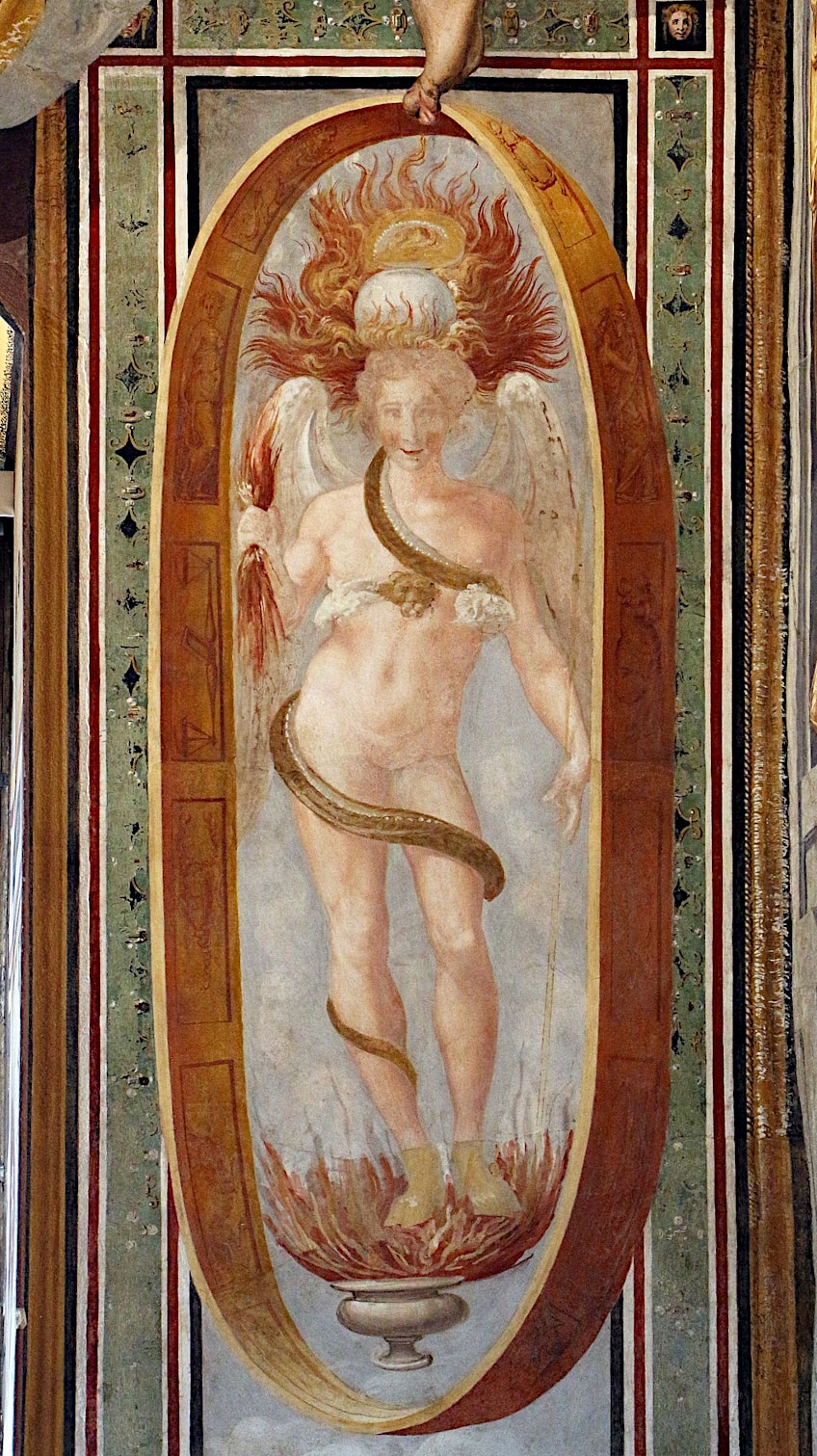 Phanes by Francesco Salviati (1543-45); Sailko, CC BY 3.0, via Wikimedia Commons
Phanes by Francesco Salviati (1543-45); Sailko, CC BY 3.0, via Wikimedia Commons
Uranus’ Personality and Attributes
Except for his genitals in the castration story, Uranus was not typically anthropomorphically personified. He was just the sky, which the ancient Greeks imagined as an overhanging bronze dome kept in place by Atlas, the Titan god. Uranus was seldom shown in ancient Greek art because he was almost never envisaged in human terms.
Uranus was later absorbed into various deities by the Romans, including Aeon and Caelus.
On the very rare occasion that Uranus has been portrayed, it is as a muscular individual, generally bare-chested, often youthful and beardless. He’d also occasionally be portrayed balancing on a zodiac. He was most often represented in Roman art on marble sarcophagi and reliefs.
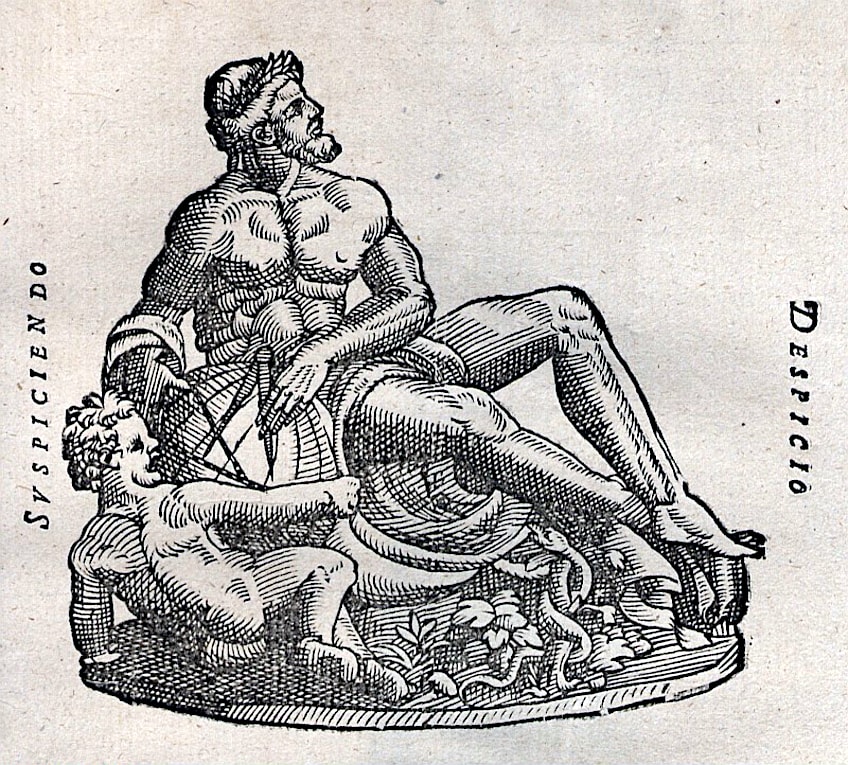 Illustration depicting the God Uranus from Tycho Brahe’s Astronomie & Forschung (1610); Tycho Brahe, Public domain, via Wikimedia Commons
Illustration depicting the God Uranus from Tycho Brahe’s Astronomie & Forschung (1610); Tycho Brahe, Public domain, via Wikimedia Commons
Uranus and the Zodiac Wheel
Because Uranus was seen as the personification of the sky, his realm was depicted at great length in ancient Greek mythology. It was common for ancient authors to depict all locations and dominions, heavenly and mortal, in considerable detail, and the depiction of the sky was no different.
The ancient Greeks thought of the sky as a dome that stretched across the planet and was adorned with stars. This huge dome extended all the way to the Earth’s edge.
Uranus was closely associated with the zodiac, the foundation on which much of Greek mythology and religious philosophy was built, because of his strong ties to the sky and hence the stars. It was believed that by studying and understanding the celestial bodies, one could possibly comprehend the cosmos and all of its inherent mysteries. The planet Uranus is regarded as the ruler of Aquarius in Astrology, a time of electric activity and change, just like the sky deity himself. Uranus is the solar system’s frenzied creator, a force that presses beyond great difficulties in order to create things, much like the Greek deity who produced many notable descendants with Gaia.
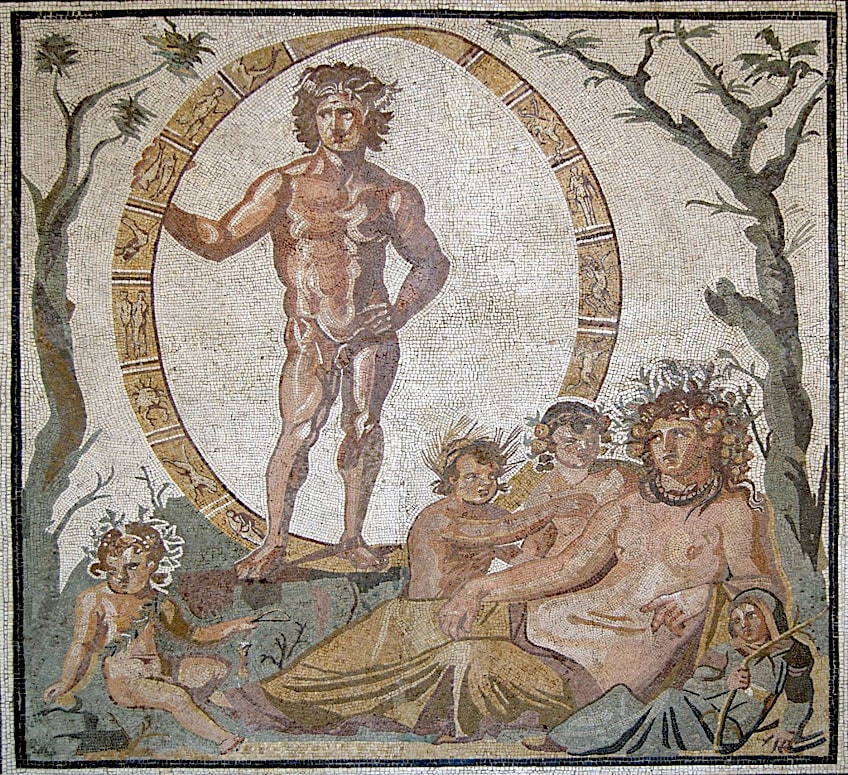 Roman Mosaic depicting Gaia and Aion with the Seasons and Zodiac (200-250 CE); Glyptothek, Public domain, via Wikimedia Commons
Roman Mosaic depicting Gaia and Aion with the Seasons and Zodiac (200-250 CE); Glyptothek, Public domain, via Wikimedia Commons
The Domain of Influence
Uranus represented the immense expanse above the Earth as the ancient Greek embodiment of the sky. He ruled the heavenly domain and everything that existed inside it, including the constellations and other celestial objects. Uranus’ connection to the skies and cosmic energies also connected him to the ancient Greek concepts of fate and cosmic order. The positions of these stars and heavenly bodies were thought to impact the fates of both humanity and the gods, and Uranus served to keep this cosmic order in place. As a concept, Uranus symbolizes the vastness and power of the universe.
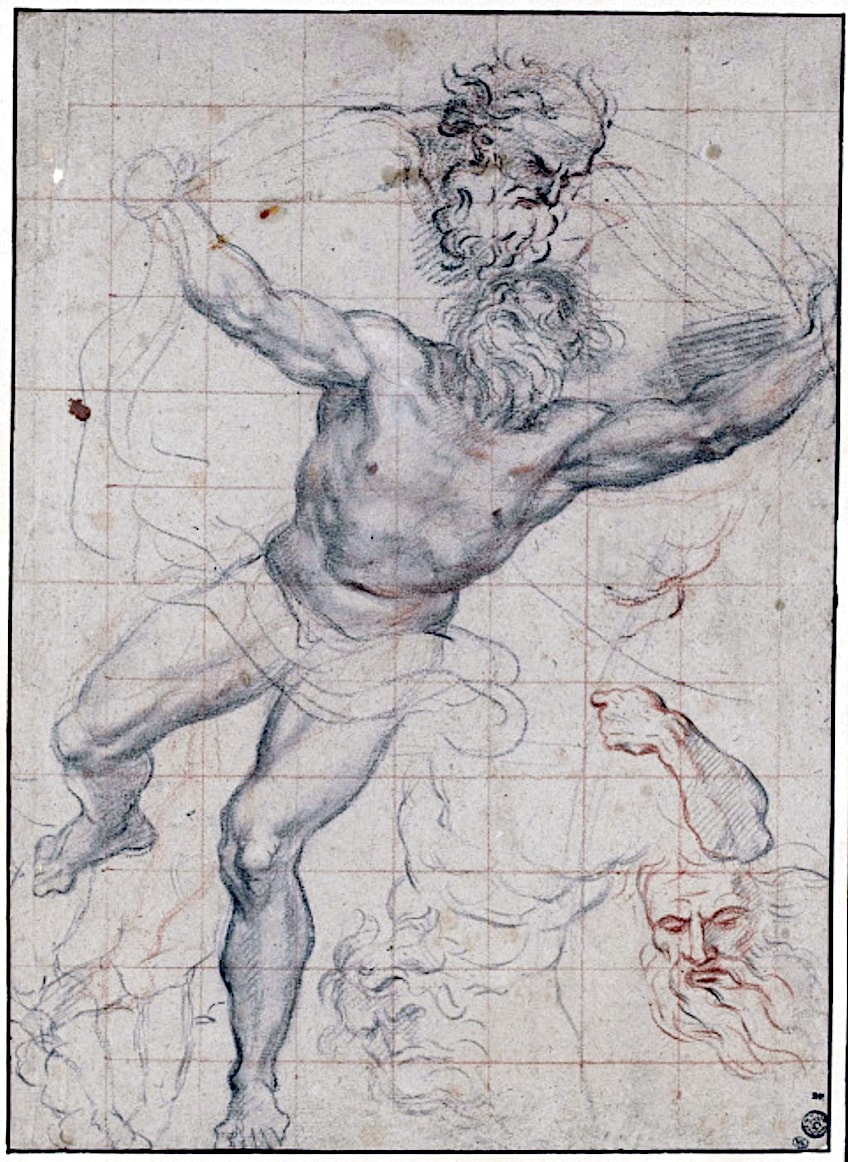 Studies for Uranus Carrying the Veil of Night by Antoine Coypel (c. 1684); Antoine Coypel, Public domain, via Wikimedia Commons
Studies for Uranus Carrying the Veil of Night by Antoine Coypel (c. 1684); Antoine Coypel, Public domain, via Wikimedia Commons
Of course, he is also regarded as significantly influential due to his role in the primordial creation story and his divine progeny. He was one of the first primordial gods, appearing at the dawn of time. However, in myth and literature his name was closely associated with his sons the Titans, as when Zeus warns Ares that he would gladly imprison him even deeper in the earth than the sons of Uranus.
As with all the pre-Olympian gods, Uranus symbolized a different time in the history of the world when even the gods were violent and ignorant of order and justice.
Uranus’ Mythology
As one of the primordial gods, Uranus’ mythology mostly focuses on his initial role as one of the first generation of gods and his dethronement by Cronus. While we have already touched on Uranus’ mythology above regarding his role in the creation of his offspring and his eventual castration, we will now go into it in greater detail, since they are the only notable stories associated with the Greek god Uranus.
Uranus and the Titans
Gaia and Uranus produced a succession of divine beings together known as the Titans, the Hectencheires, and the Cyclopes. Uranus, despite having so many offspring, was not a very adequate or caring parent. As soon as Gaia gave birth, he pushed the child back into her. In addition, the very fertile sky-god kept impregnating the exasperated earth. Gaia could no longer endure it, so she begged her sons to protect her against their father.
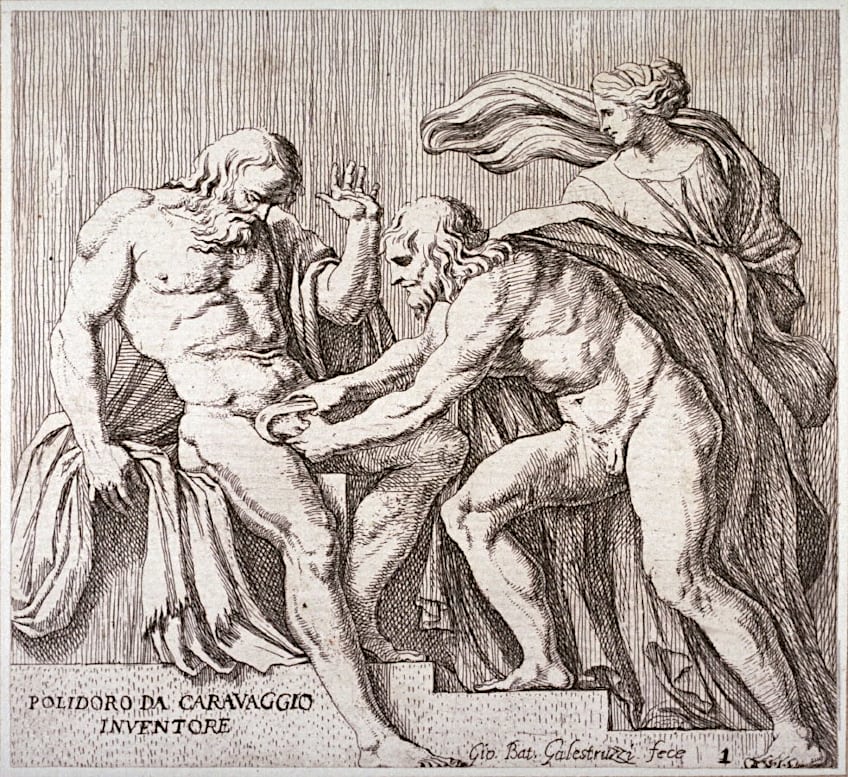 Castration of Uranus engraving after Polidoro da Caravaggio’s fresco on the façade of the Palazzo Milesi in Rome (17th Century); Printmaker:Giovanni Battista GalestruzziAfter:Polidoro da Caravaggio, Public domain, via Wikimedia Commons
Castration of Uranus engraving after Polidoro da Caravaggio’s fresco on the façade of the Palazzo Milesi in Rome (17th Century); Printmaker:Giovanni Battista GalestruzziAfter:Polidoro da Caravaggio, Public domain, via Wikimedia Commons
Except for Cronus, all of them declined her request, maybe out of fear of their father’s anger. However, in other versions of the myth, all of Uranus’ sons took part in his overthrow. Cronus was given a sickle-like weapon fashioned by Gaia. Cronus hid in the bed chamber of his parents, where he attacked and then castrated Uranus.
According to Hesiod Uranus denounced his sons’ betrayal, calling them “Titans” for having “strained” (titaino) against his paternal authority by seeking “vengeance” (tisis) against him.
Sites Associated with the Greek God Uranus
As a primordial god, Uranus was more significant in myth, than in cult. In antiquity, there were some sites associated with Uranus’ mythology. The whereabouts of Cronus’ sickle and the location of his castration were claimed by several different locations. Two of them were on the Italian island of Sicily.
Cronus’ sickle was buried in Sicily, according to Callimachus (c. 270 BCE), the poet from Alexandria, and was “concealed in a hollow beneath the ground” there.
Drepanum, the second Sicilian location, apparently got its name from the Greek word for “sickle”. Lycophron (about 270 BCE), another Alexandrian poet, recounts “rounding the Cronus’ Sickle’s leap”, presumably referring to the “leap” of the sickle that was flung into the waters at Drepanum. However, other locations were also linked to this mythical sickle.
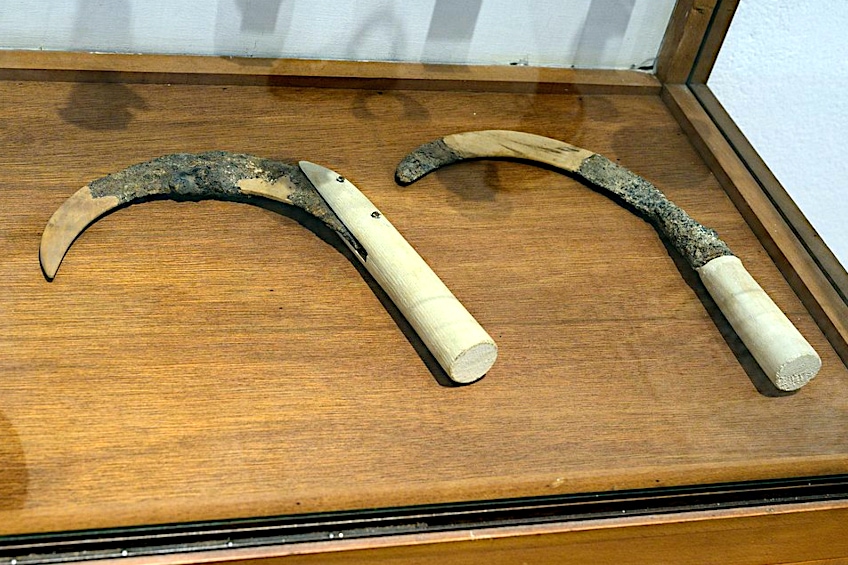 Reconstructed ancient Greek sickles from a purification pit in Rheneia, Delos (Geometric Period); Zde, CC BY-SA 4.0, via Wikimedia Commons
Reconstructed ancient Greek sickles from a purification pit in Rheneia, Delos (Geometric Period); Zde, CC BY-SA 4.0, via Wikimedia Commons
According to Pausanias, a geographer, the sickle was flung into the waters from the cape of Bolina, close to Argyra on the Achaean coast, and “because of this, they call this cape Drepanum”. The sickle was said to have been discovered by the historian Timaeus in Corcyra, home of the Phaeacians, who were yet another group of people said to have arisen from Uranus’ blood.
Uranus in Roman Mythology and Beyond
Uranus is known as Caelus in Roman mythology. The Romans typically incorporated and adapted aspects of Greek mythology into their own distinctive pantheon, providing the deities with Roman names and even changing their traits or responsibilities.
As with Uranus, Caelus represented the sky and was regarded as the Titans’ father.
As Christianity became Europe’s main religion in the centuries that followed Roman mythology, the impact of Greco-Roman mythology waned, notably throughout the Middle Ages and into the Renaissance era. The stories of the ancient divine Succession myth appear to have retained their allure, even though medieval writers and artists tended to confuse the two oppressive fathers, Uranus and Cronus/Saturn with one another.
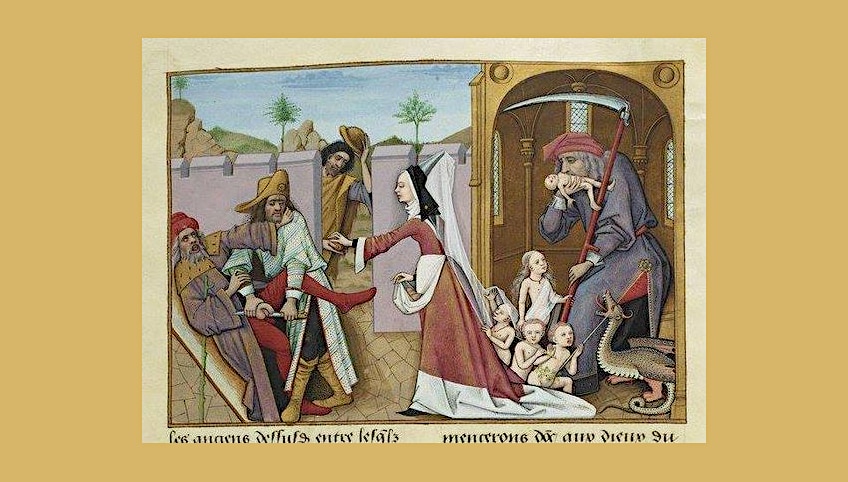 The Family of Gaia and Uranus by Evrart de Conty (c. 1401); Robinet Testard, Public domain, via Wikimedia Commons
The Family of Gaia and Uranus by Evrart de Conty (c. 1401); Robinet Testard, Public domain, via Wikimedia Commons
The Naming of the Planet Uranus
Ancient peoples counted only the planets visible to the human eye. The invention of the telescope enabled astronomers to improve their knowledge of our solar system by finding new celestial objects. In the late 18th century. Sir William Herschel, a German-British astronomer, was examining the night sky with his handmade telescope in Bath, England on the 13th of March, 1781. Herschel noticed an unknown object that he assumed could be a comet. However, when he tracked its movements over the next few months, he realized that he was observing a new planet outside the bounds of the known solar system at that time.
Herschel named the celestial body “Georgium Sidus” initially, after King George III of the United Kingdom as a gesture of allegiance and to gain royal support.
Nevertheless, this name was not widely adopted, especially outside of the United Kingdom. The director of the Berlin Observatory at the time, Johann Bode offered the name “Uranus” in 1783. Bode proposed naming the newly found planet Uranus after the ancient Greek deity of the sky. This made sense as it adhered to the custom of naming planets after ancient mythological deities. However, most astronomers kept calling the planet “Herschel” until 1850, when “Uranus” was universally adopted.
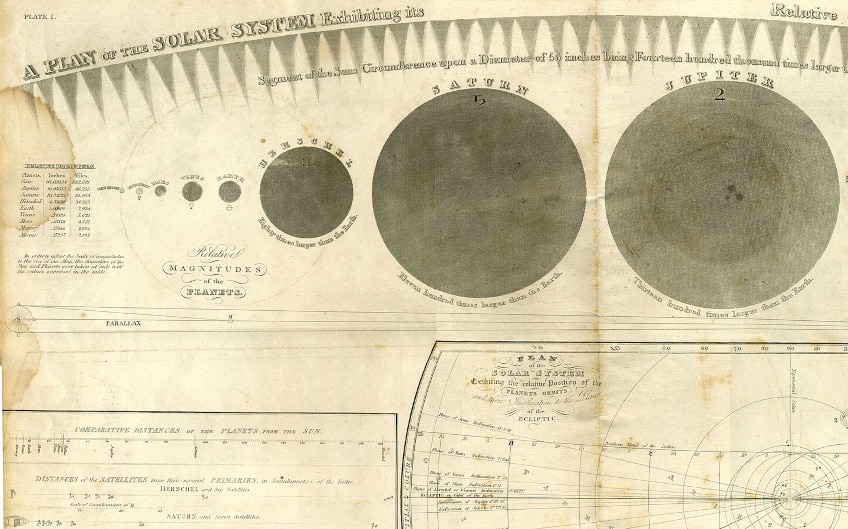 Illustration from Burritt’s Geography of the Heavens (published 1835) with the planet Uranus still identified as “Herschel”; William Creswell from Seattle, Washington, USA, Public domain, via Wikimedia Commons
Illustration from Burritt’s Geography of the Heavens (published 1835) with the planet Uranus still identified as “Herschel”; William Creswell from Seattle, Washington, USA, Public domain, via Wikimedia Commons
The Legacy of the Greek God Uranus
The myths of Uranus and his son Cronus demonstrate the futility of repression in establishing a society that will endure. It was only when Zeus created the Olympian order that the cycle of automatic oppression with the resultant rebellion and overthrow came to an end. On a different level, it could also be argued that the castration of the sky who constantly impregnated the earth by his son named “Time” represents the inevitable loss of male fertility with age.
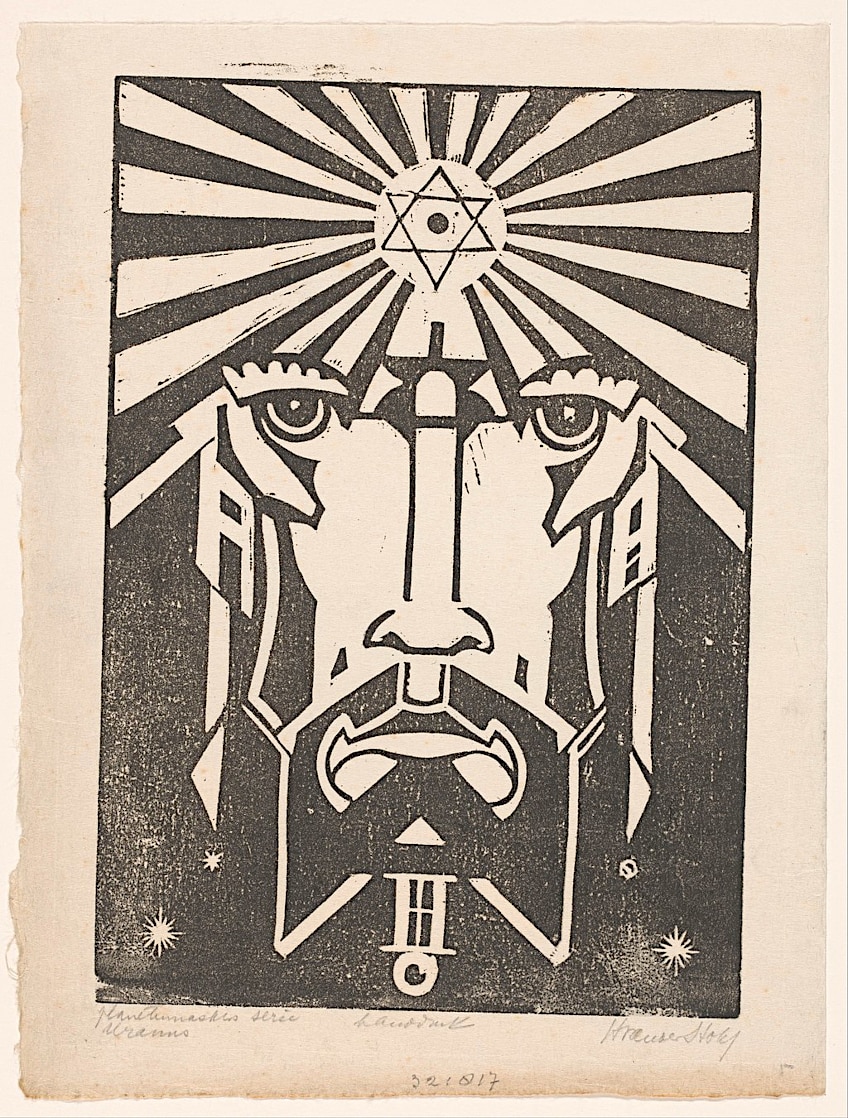 Uranus (Planetary Masks) by Henri van der Stok (between 1880-1932); Rijksmuseum, CC0, via Wikimedia Commons
Uranus (Planetary Masks) by Henri van der Stok (between 1880-1932); Rijksmuseum, CC0, via Wikimedia Commons
Uranus, while absent from many of the major Greek epics and dramas, lives on in the appearance of his titular planet and in astrology. However, the mythology of the primeval sky deity gives one final ironic insight: Uranus the planet is located right next to his vengeful son, Cronus (Saturn). He is mostly known as the progenitor of the subsequent generations of gods that all had much richer mythologies, as well as his role as the sky god, and the sky itself – a dome that covered the flat earth of the ancient Greek imagination.
In ancient Greek mythology, Uranus was the Greek deity of the sky from whom every other deity descended. He was regarded as a former god in ancient Greek religion, and rarely portrayed in artwork until the time of the Romans. However, despite not being worshiped or having many myths associated with him, he is still highly regarded for his role in the creation of the Greek pantheon alongside Gaia, the name given to Mother Earth. From their union came forth the Titans, and eventually the Olympians. The story of Uranus marked the beginning of a generational struggle for power, as one group of gods fought to dethrone the previous generation of gods. Despite not being a commonly featured character in Greek Mythology, he is among the few to have a planet in our solar system named after him!
Frequently Asked Questions
What Was the Role of the Greek God Uranus?
Uranus was largely thought to represent the sky and its vastness. He represented the link to the heavenly world, which extended above the Earth. He was one of the primordial gods – the very first in Greek mythology. As a result, he contributed significantly to the formation of the cosmos and cosmic order. The Titans, who were the earliest group of gods to exist before the Olympians, were fathered by Uranus. A total of 12 Titans were born as a result of his coupling with Gaia – six gods and six goddesses. Since Uranus is also the son of Gaia, his lineage spans the ages of the gods. The hierarchy and connections between the divine creatures in Greek mythology are established through his genealogy and bloodline.
What Myths Are Associated With Uranus?
The myth most associated with this primordial god would be his castration by his son. This act of violent rebellion forms part of the series of divine successions leading up to the establishment of the Olympian order. Uranus’ castration led to the birth of various entities from his blood as it spilled on his wife, the Earth, while Aphrodite was born from the foam that resulted when Cronus threw his father’s severed genitalia into the ocean.
What Is the Greek God Uranus’ Symbol?
As the Greek god of the sky, his influence included any of the celestial objects within the heavens, including the constellations. Due to his position in the sky and his dominion over everything within it, he is often associated with the Zodiac wheel. The 12 astrological signs and their subgroups are shown in a circular pattern known as the zodiac wheel. The planet Uranus, which rules Aquarius, is thought to be responsible for creativity, development, and individualism. Astrology analyzes and interprets Uranus’ effect on people’s personalities, life events, and overall societal changes based on where it falls on the zodiac wheel. The ancient Greeks also believed that the Earth was actually a flat plane and that there was a massive bronze dome that formed the sky above them. To these ancient people, Uranus was the embodiment of that dome, as their knowledge of the skies was rather limited.

I am deeply passionate about history and am constantly fascinated by the rich and complex stories of the past. As the editor-in-chief of learning-history.com, I have the opportunity to share this passion with a wide audience through the creation and distribution of engaging and informative content about historical events, persons, and cultures. Whether it’s through writing articles and blog posts or creating videos or podcasts, I strive to bring the past to life in a way that is both accurate and enjoyable. My expertise in history, combined with my strong writing and communication skills, allows me to effectively communicate complex historical concepts and make them accessible and interesting to a wide range of readers. I am truly grateful for the opportunity to share my love of history with others through my work on learning-history.com.

